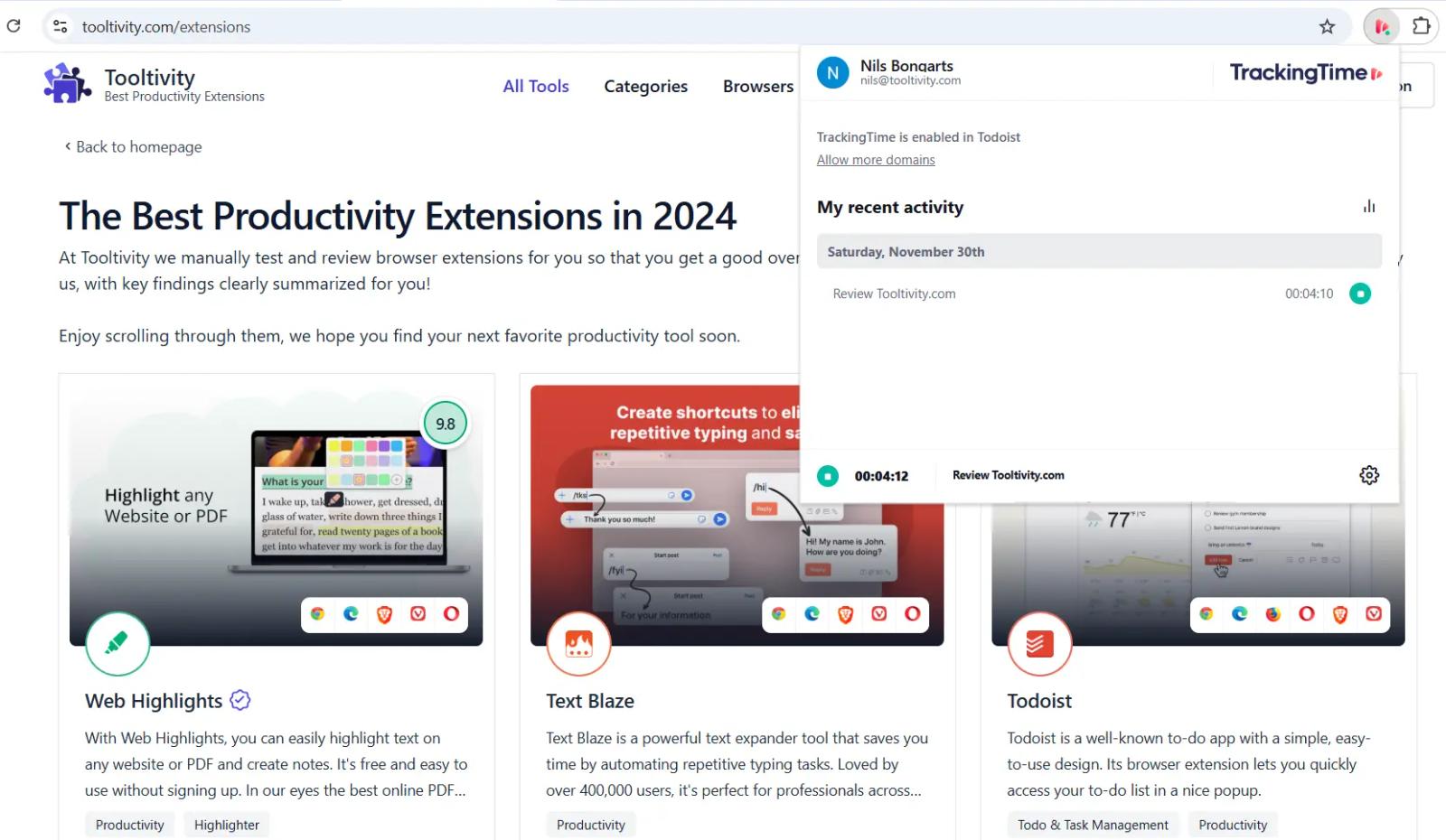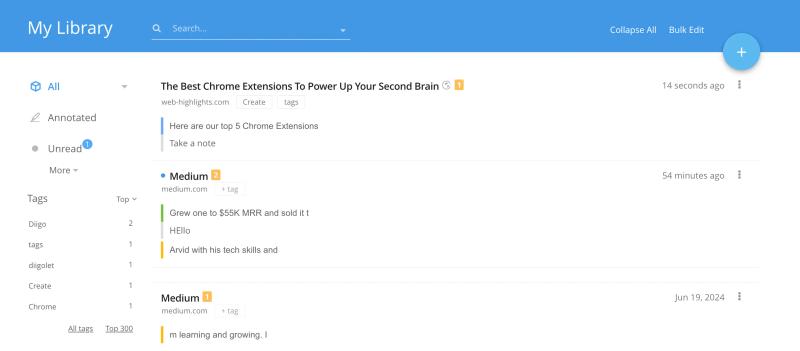Compare Tracking Time and Diigo: Which Extension is the Best?
Tracking Time is a tool for managing tasks and projects with ease. It offers strong integrations and reporting with few functions and many bugs, which lowers the rating. | Diigo is a handy tool for bookmarking, highlighting, and annotating web pages. It has many features, but its old design and limited highlight colors might make it less appealing. | |
| Key Features A summary of the most important features offered by each extension. |
|
|
| Our Rating Tooltivity's expert review score for each extension, based on hands-on testing and research. | 7.6 | 7.8 Winner in this category |
| Total users Total active users across all major browsers: Chrome, Edge, Firefox, and Safari. | 32,069 | 200,000 Winner in this category |
| Total ratings Total number of user ratings received across all supported browsers. | 158 | 2,324 Winner in this category |
| Average rating Average user rating across all browsers, calculated from available store ratings. | 3.4 ⭐ | 4.6 ⭐ Winner in this category |
| Entry Level Price The minimum price required to start using the extension. "Free" means a free tier is available. | Free | Free |
| Chrome User rating and stats for the extension on Chrome browser. | 4.4 4.23 Average Chrome Web Store rating from the last 100 reviews 30.0K+Users | 4.6 3.53 Average Chrome Web Store rating from the last 100 reviews 200.0K+Users Winner in this category |
| Edge User rating and stats for the extension on Edge browser. | 3.0 3.67 Average Microsoft Edge Store rating from the last 100 reviews 1.7K+Users Winner in this category | - |
| Firefox User rating and stats for the extension on Firefox browser. | 2.8 3.36 Average Mozilla Firefox Add-ons Store rating from the last 100 reviews 396Users Winner in this category | - |
| Safari User rating and stats for the extension on Safari browser. | - | - |
| Features Tooltivity's expert score for the 'Features' aspect of each extension. | 5.5 Tracking Time offers numerous functions aimed at both individual users and teams. Projects can be created for which time tracking can then be started. Detailed reports can then be output. In our tests, all these functions also worked in the Tracking Time tool. 
The Tracking Time extension therefore has great potential to integrate many useful Tracking Time functions. However, the functions are currently very limited in comparison to competitors. | 8.5 Diigo offers basic features for a highlighter and bookmarking tool. It works well and we were able to highlight most websites and they were recreated when revisiting them. The highlighter popup makes it easy to highlight text offering 4 colors. It looks like this:  We would have wished to have more color options. Also, note-taking and the tagging functionality are working, but its design does not look appealing.  The dashboard where your highlights are stored works well and gives you an overview of all your highlights.  Winner in this category |
| Performance Tooltivity's expert score for the 'Performance' aspect of each extension. | 8.0 In general, Tracking Time works reliably, but in reviews some users have reported occasional slowdowns, especially when processing large data sets. Regular updates and optimizations could help improve performance consistency. Winner in this category | 8.0 Diigo performs well in terms of highlighting and syncing across devices. The fact that highlights are always synchronized can cause some loading delays. It's not as fast as other highlighters that use an offline-first approach, but it works reasonably well. However, the unreliable link creation feature and the simple sidebar outliner design need improvement. Winner in this category |
| Design Tooltivity's expert score for the 'Design' aspect of each extension. | 8.0 The design of Tracking Time is clean and modern and makes it easy to navigate. The dashboard on the website is well organized and you get an instant overview of your times. There are still improvements to be made in terms of customization options such as layouts. Winner in this category | 7.0 The design fulfills its functionality. The design of Diigo is outdated and could use a modern refresh. The lack of a nice overview of all your highlights on the page itself means you have to open the dashboard on diigo.com instead. The dashboard on diigo.com is okay, but other highlighters like Web Highlights have a much nicer user interface. |
| Value for Money Tooltivity's expert score for the 'Value for Money' aspect of each extension. | 8.0 The web extension is free of charge. However, it should be noted that it offers only a few functions. Other competitors offer considerably more functions for their free extensions. If you only use the extension in addition to Tracking Time and consider all functions in the price-performance ratio, it is competitive. In particular, the free plan already offers sufficient features for most people. Winner in this category | 8.0 The free version of Diigo offers basic features and is fine for most users. The paid plans are reasonably priced and similar to other highlighters. However, we think other highlighters offer more value for the same price. Winner in this category |
| Ease of Use Tooltivity's expert score for the 'Ease of Use' aspect of each extension. | 7.0 Although the tool is generally easy to use on the website, there are problems with the basic functions of the extension. In the test, we started a time recording on the website and stopped it later via the extension. When we wanted to start a new task, it took us a while to understand the principle that only tasks that had already been created could be restarted. This is not an intuitive function, which is why users might be annoyed right from the start. | 7.8 Diigo is fairly easy to use, but the sidebar outliner takes some time to get used to. You can't see all your highlights on the page itself, so you have to go to the dashboard on diigo.com. We wish there was a sidebar to quickly access all our highlighted pages, like in the Web Highlights extension. Winner in this category |
| Security & Privacy Tooltivity's expert score for the 'Security & Privacy' aspect of each extension. | 9.0 Tracking Time uses basic security measures to protect user data. Encryption and regular updates ensure the integrity of the data. In our research, most of this could be read in the privacy policies, but a little more transparency in the handling of user data would still be an advantage, as this is stored online. Winner in this category | 7.5 Diigo takes reasonable steps to protect user data. However, since you need an account and your data is stored in their database, absolute protection can't be guaranteed. We think a highlighter should work without needing to sign up, but this feature is missing in Diigo. |
| Conclusion A summary of our findings and final thoughts for each extension. | Tracking Time is a tool for anyone who wants to improve their time management. The design is very intuitive, but unfortunately, the extension has hardly any functions. The extension is useful for anyone who uses Tracking Time, but anyone looking for a good extension for time tracking will not find it here. | Diigo is a handy tool for collecting stuff from the web, like bookmarks, highlights, and notes.
|
| Our Recommendation | In our comparison between Tracking Time and Diigo, Diigo came out on top, scoring 7.8. Diigo is the most widely used, with over 200k users and 2k+ reviews—and it also delivered the strongest performance in our tests. User reviews for Tracking Time reflect our findings, while we rate Diigo lower than users do. Notably, Diigo has the highest user rating in the Chrome Web Store at 4.60, which is even higher than our rating of 7.8. In the end, the differences between these extensions are minimal, so your choice may come down to personal preference or specific features.
If you want a quick recommendation, Diigo is our top pick. But as always, the best choice depends on what matters most to you. | |

